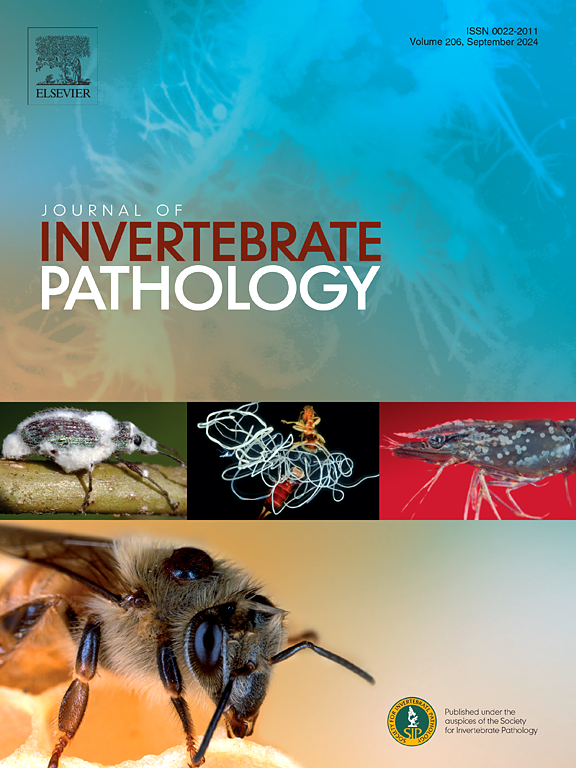Fire ants exhibit self-medication but lack preventive behavioral immunity against a viral pathogen
IF 2.4
3区 生物学
Q1 ZOOLOGY
引用次数: 0
Abstract
Behavioral immunity in ants encompasses collective behaviors that help defend against pathogens and parasites by reducing infection risks and limiting disease spread. However, much of the research has focused on fungal pathogens, leaving the behavioral immunity responses to viral pathogens largely unexplored. This study represents the first attempt to characterize behavioral immunity in ants against viral pathogens using the red imported fire ant, Solenopsis invicta and one of its common viruses, Solenopsis invicta virus 3 (SINV-3), as the model system. Given that SINV-3 infection has been shown to cause adverse effects on fire ants, we hypothesized that fire ants may mount behavioral immunity defenses against SINV-3 infection, specifically through avoidance behavior, organizational segregation worker discrimination, and self-medication. Surprisingly, none of the preventive behavioral immunity behaviors we tested were observed, suggesting fire ants’ inability to detect or mount collective defenses against SINV-3 infection. However, SINV-3-infected fire ants exhibited increased consumption of reactive oxygen species (ROS)-containing food, providing evidence of therapeutic self-medication. These findings suggest that while no evidence suggest fire ants employing preventive behavioral immunity against SINV-3, they may mitigate the effects of infection through self-medication, highlighting a different adaptive strategy in response to viral pathogens. This study opens new avenues for understanding the adaptive strategies of ants to cope with viral pathogens.

火蚁表现出自我药疗,但缺乏对病毒病原体的预防行为免疫
蚂蚁的行为免疫包括通过减少感染风险和限制疾病传播来帮助抵御病原体和寄生虫的集体行为。然而,许多研究都集中在真菌病原体上,使得对病毒病原体的行为免疫反应在很大程度上未被探索。本研究首次以红火蚁(Solenopsis invicta)及其常见病毒之一Solenopsis invicta病毒3 (SINV-3)为模型系统,研究了蚂蚁对病毒病原体的行为免疫特性。鉴于新冠病毒-3感染已被证明会对火蚁造成不良影响,我们假设火蚁可能会对新冠病毒-3感染进行行为免疫防御,特别是通过回避行为、组织隔离、工人歧视和自我药物治疗。令人惊讶的是,我们测试的所有预防行为免疫行为都没有被观察到,这表明火蚁无法检测或建立针对SINV-3感染的集体防御。然而,sinv -3感染的火蚁表现出对含活性氧(ROS)食物的消耗增加,这为治疗性自我药物治疗提供了证据。这些发现表明,虽然没有证据表明火蚁对siv -3具有预防性行为免疫,但它们可能通过自我药物治疗来减轻感染的影响,突出了对病毒病原体的不同适应策略。本研究为理解蚂蚁应对病毒病原体的适应策略开辟了新的途径。
本文章由计算机程序翻译,如有差异,请以英文原文为准。
求助全文
约1分钟内获得全文
求助全文
来源期刊
CiteScore
6.10
自引率
5.90%
发文量
94
审稿时长
1 months
期刊介绍:
The Journal of Invertebrate Pathology presents original research articles and notes on the induction and pathogenesis of diseases of invertebrates, including the suppression of diseases in beneficial species, and the use of diseases in controlling undesirable species. In addition, the journal publishes the results of physiological, morphological, genetic, immunological and ecological studies as related to the etiologic agents of diseases of invertebrates.
The Journal of Invertebrate Pathology is the adopted journal of the Society for Invertebrate Pathology, and is available to SIP members at a special reduced price.

 求助内容:
求助内容: 应助结果提醒方式:
应助结果提醒方式:


